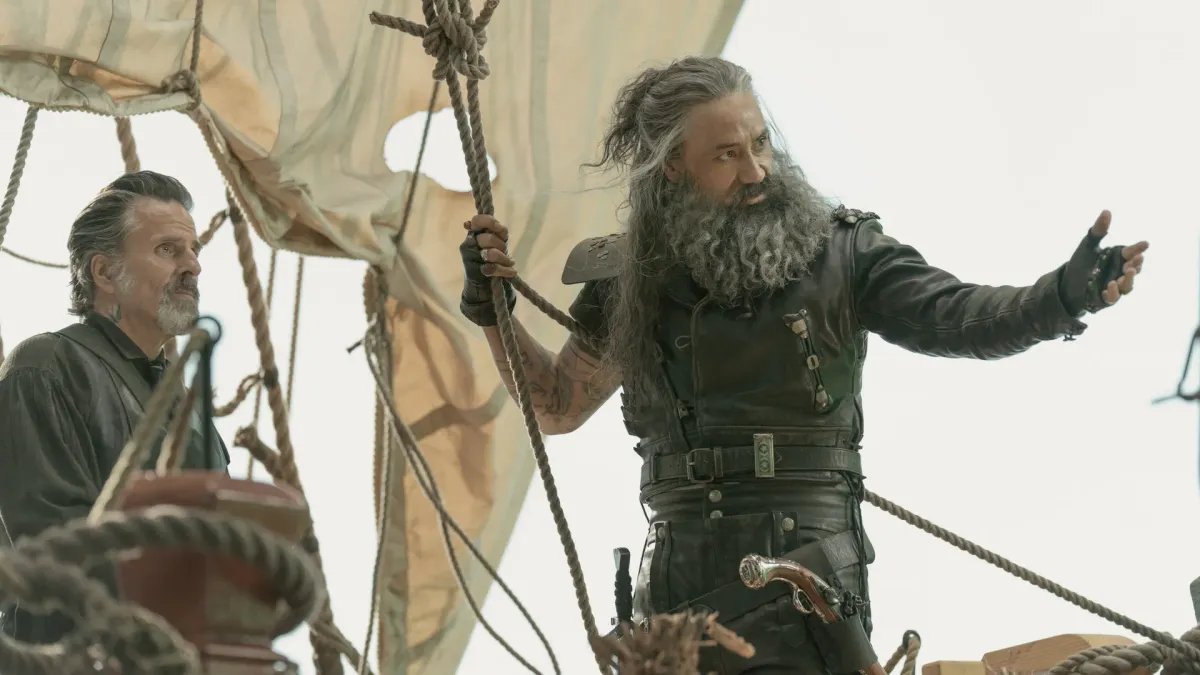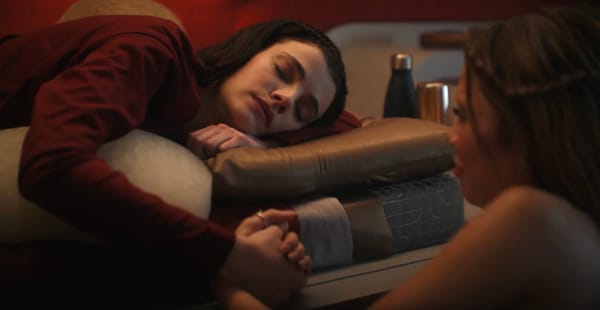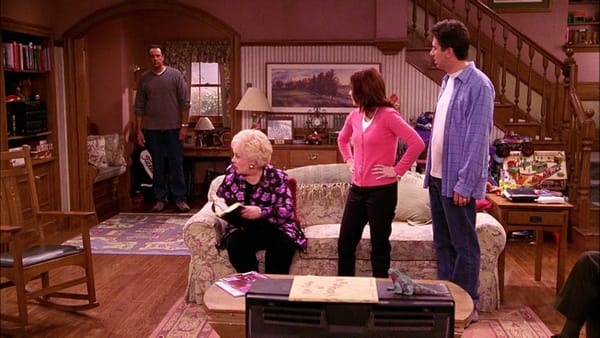Our Flag Means Death: "A Gentleman Pirate" and "Discomfort in a Married State"
In which we contemplate queerbaiting

(This is the second installment of my biweekly recaps of Our Flag Means Death, the HBO Max comedy series that debuted in March 2022 and quickly discovered an adoring fandom. I’ve never seen it! These recaps are only available to paid subscribers.)
- “A Gentleman Pirate” (originally aired March 3, 2022)
- “Discomfort in a Married State” (originally aired March 10, 2022)
I am not someone who colors outside the lines when it comes to the characters I ship in fiction. Tell me two characters are destined to end up together, and I will believe you until you say otherwise. Show me two characters frequently interacting, sometimes quite intimately, and I will still be surprised when they start kissing. I was the person saying, "Wait, what??" when Friends hooked up Monica and Chandler, for instance.
Here's a current example: During the current season of What We Do in the Shadows, FX's delightful, critically adored vampire comedy, I have suddenly realized there is an enormous group of fans who are very into the idea of Nandor and Guillermo getting together. The second I heard this, I thought, "Well, that's just absurd!" And yet a core tenet of the show is that Guillermo hopes Nandor will make him into a vampire, and inherent to vampirism is a certain eroticism and desire. The show told me all along that there was at least some reason to hope these two crazy kids get together; I was largely oblivious to this until the internet pointed it out.
And yet the second Stede and Blackbeard looked upon each other, I was, like, "Oh, this is why everybody says this show is queer."

Our Flag Means Death has plenty of other queer elements to recommend it. The gender fuckery inherent to the character of Jim, the vague crushes among the characters that are already developing, and the inherent homoeroticism within a space that features so many men all add up to a show bursting with queer energy. Yet I don't know if the series would be talked about so fervently as a queer one were it not for the obvious chemistry between Stede and Ed. It's the kind of chemistry that makes one want to invent portmanteaus that can only hope to contain it. (Of the ones I've run across, I prefer Blackbonnet.)
What's interesting to me is how the show conveys that you're "supposed" to be rooting for Stede and Ed by offering a pinch of techniques taken from cishet romance, then mixing them with a dash of queer coding. There's a marvelous, queer energy to, say, Stede and Ed swapping outfits, but it's exactly the sort of idea that wouldn't feel out of place in a 1930s screwball romantic comedy. (You can imagine Hildy and Walter from His Girl Friday switching outfits if it got them the scoop.) And yet, if a cishet couple swapped clothes onscreen, for most of cinematic history, that would have been more transgressive than Stede and Ed doing so. Our Flag Means Death is working both sides of the crowd, in a way I find very appealing.
It's also doing the "these two guys are into each other" beats really well. There are few romantic tropes more well-worn than "waking up from a long illness under the care of the one who loves you." Yet we keep returning to that trope because it's appealing and alluring to imagine yourself completely at the mercy of someone you don't realize you're in love with, who perhaps doesn't realize they're in love with you. Our Flag Means Death also pulls off that trope.
I'm interested in this enormous grey area between the intentionality of what Our Flag Means Death is doing and the dreaded specter of "queerbaiting." Queerbaiting is when fans of a work of fiction feel that two characters are being primed for a queer relationship, only for that relationship never to materialize (see also: Sherlock) or, worse, to be floated for a brief moment before being yanked away (see also: Supernatural).
A lot of queerbaiting is in the eye of the beholder. Queer people have been reading queerness into art for as long as we've existed, and it's natural for us to become convinced two characters should be in a queer relationship, even if the canon will never allow them to be. (I, for instance, think We Are Lady Parts has beautifully set up Amira and Saira to get together — but both women are ostensibly straight. I GUESS WE'LL JUST SEE.)
Problems arise when fans become convinced the queerness they see in the subtext is intentional in the text, only to realize the creators have no intentions of making that queerness text. Perhaps the worst example of this was, indeed, Sherlock. I never quite understood the certainty from some fans that Sherlock and Watson belonged together, for instance. Still, when the fans who were sure the two should be together became extremely loud, the show seemingly went out of its way to mock those fans and bait them with thwarted queerness, which was shitty. That's a textbook case of queerbaiting.

Other cases are... less clear-cut. Sometimes, two actors just have a chemistry you're not anticipating when you're writing. Sometimes, the fans latch onto a relationship you didn't even see coming. And sometimes, people just read friendship as romantic or homoerotic in nature (both in fiction and real life). Is it queerbaiting if a show casts two actors who really spark, but both of them are playing cishet characters? I would argue no because I think queerbaiting requires intentionality. But also: How do we determine what goes through creators' heads?
And some fans have their radar turned up so high for queerbaiting that they become dismayed every time two characters of the same gender have an emotionally complicated relationship. Shortly after Yellowjackets debuted, for instance, someone DMed me on Twitter to ask if I thought the show was queerbaiting the audience with the teenage characters Shauna and Jackie. To that point, the show had mostly shown them having a complicated teen girl friendship, one where they were both hooking up with the same guy. Yet the presumption was that the only thing that could cause such heightened emotions was romantic tension. Yet I don't think that's true, or every teen girl friendship I had was queerbaiting. (Honestly, given the emotional tenor of some of them, they might have been.)
So it's important to avoid queerbaiting but also, increasingly, to avoid the appearance of queerbaiting, even though the latter is nearly impossible to pull off. When it comes to a show like Our Flag Means Death, then, figuring out a way around this problem is even more fraught. I know from the simple fact that the show received a GALECA nomination for its portrayal of queer themes that it almost certainly resolves this romantic tension. But would I have known that if I watched these episodes back in March when they debuted? Or would I have assumed the show was setting me up with Stede and Ed gazing into each other's eyes? Would I have gotten preemptively mad at it?
I can't know, but I like to think the answer is "no." So much of what drives Stede across these first four episodes — especially "Discomfort in a Married State" — is a quest to define himself. He thinks piracy is the way he might find that definition, but it's also clear that almost nobody buys it without serious convincing. Yet as the show digs more into his backstory, into an unhappy marriage, into a childhood spent more interested in finery than anything rough and tumble, the more viewers realize that Stede simply lacks a language to describe himself. To some degree, he can't fall in love with Ed because he doesn't realize that's even a possibility.
To find words that make sense of yourself, you must find a place where you feel safe and at home. Stede hasn't had that until just now, as captain of the Revenge, but now that he's building that space, he can start interrogating all the rules for his life that fit him poorly. There's something in this show about how Stede's wealth allows him the space to do things like this in a way few others would be afforded, and I'd love it if the show interrogated it a little more. Yet its central idea of a kind of queer utopia being necessary to find one's true self holds fast.
What's more, I think Our Flag Means Death escapes feeling like queerbaiting because its entire existence is about the idea of building societies outside of society. When the characters visit the Republic of Pirates, that's an example of a world outside the established world, and so is every pirate ship we've been on. The only exceptions are ships belonging to various royal navies, all of which seem too fussy and buttoned down. Living in the world requires a certain anarchic sense of self, and in an overly rigid society, one can only find that anarchy by going off the map. In Our Flag Means Death, queerness and anarchy are never very far apart, which is maybe as it should be.
I didn't like either of these episodes as much as I liked the first two, but I think I have a better sense of what the show is from watching them, and it's a show I like very much on the whole. It's loose and playful and somehow very, very queer without really calling attention to itself. As I watched it, I kept thinking about finding somewhere you belong and how belonging is never a permanent state. Even when you fall in love with "the" person, the two of you will go through so many permutations of yourselves that you're really falling in love with many people and taking a chance on loving all of them.
Ships are, by their nature, transitory. And so the Revenge is transitory, and so are these characters. That doesn't make the connections they form any more illusory. Even if Ed and Stede never so much as lightly peck each other on the cheek, they've still found each other. In this world, that counts for something.

Other thoughts I thought:
- Sorry this recap was a couple of days late. I forgot that Monday was Labor Day here in the States and that I was at an awards ceremony the evening prior. Thank you for bearing with me!
- I've always been flummoxed as to why we italicize the names of ships, but I guess we do. Yo ho ho to the crew of the Revenge.
- I realize I barely talked about the episodes, but they were fun. I maybe wasn't as into the Republic of Pirates episode just because it seemed like it had one too many big-name guest stars, but I'm not going to say it wasn't fun watching Leslie Jones play an angry pirate queen.
- Taika Waititi might be over-exposed at the moment, but he's absolutely and unbearably sexy in this. I will always be in favor of that.
- Speaking of Waititi, Blackbeard's delight at the various crew members of the Revenge, his excitement at having a bird guy, his aborted swing in on a rope — no notes!
- I'm not a huge fan of Claudia O'Doherty's work as Mary Bonnet, at least so far. That said, I can see where the character might be building to something in particular, so I will hold off full judgment for now.
- Despite how different their voices are, I keep thinking Con O'Neill is Gary Cole.
- While watching this, I was thinking about how we signaled to the audience on Arden that we weren't queerbaiting them and, indeed, our two main characters were meant to be flirting with each other. I think we were able to avail ourselves of something OFMD cannot, namely that our characters have words and definitions for their genders and sexualities that mostly track in a modern context.
- In future weeks, assuming that Ed and Stede continue to get closer, I'm probably going to be looking at how our ideas about queer romance still draw heavily from tropes invented for the cishets. If you have thoughts about that, put them in the comments so I might consider them.
- This absolutely isn't going to happen, but can you imagine if this show really was about Ed luring Stede in closer and closer, only to kill him and assume his identity? That's living the queer dream!
On September 19: We learn all about how "The Best Revenge is Dressing Well," then dive into "The Art of Fuckery." And it looks like we might get some Blackbeard flashbacks, which sounds fun! See you then!




